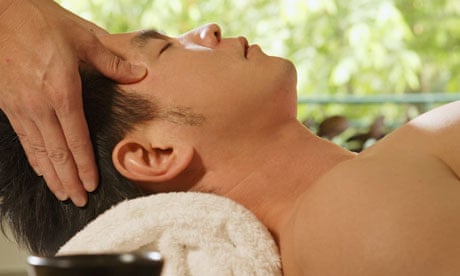When I was nine I was frogmarched to the opticians for my first sight test. It was after copying down the fact that "Marco Pob was a famous explorer" from the board at school.
The optometrist explained what the test entailed and asked me questions about how much I watched TV and used computers, all in this incredibly soothing, soft-spoken voice. When she lowered the lights and used the pen torch to see into the backs of my eyes, I experienced this tingling sensation. It began at the crown of my head and trickled over my scalp, down my neck and across my arms and legs. It was so relaxing I could have fallen asleep, though that wouldn't have been conducive to an eye examination.
About two years ago I found out that this sensation had a name and then realised I also experienced it when people played with my hair in junior school or when I would hear people type on a soft keyboard.
Have you ever experienced something similar? Perhaps when the hairdresser cuts your hair, or someone else does your makeup, or when someone roots around in a crinkly bag, or when you watch Bob Ross paint, or when the school nurse checked your hair for nits? (That last one might just be me …) If you have ever had those relaxing tingles, you were probably experiencing something called ASMR.
ASMR stands for Autonomous Sensory Meridian Response and is a neurological term used to describe those tingles. It's a feeling of otherworldly relaxation. It feels like your brain is melting in a good way. I've also heard it described as a "brain massage" or even a "head orgasm". However, I feel the need to point out to those who have never experienced this that it is not a sexual feeling. I was nine; don't be gross.
ASMR is only beginning to reach "mainstream" popularity thanks to the rise of the ASMR YouTube community. "ASMRtists" as they have been self-dubbed, create trigger videos for their subscribers and I have to tell you I'm obsessed with watching these. Trigger videos range from cranial nerve exam roleplays to videos of people crinkling bags (that have nearly half a million views). Some ASMRtists – like ephemeral rift – put a comic twist on their videos and others – like ASMRrequests – have embarked on a serial narrative within their videos. It's becoming a diverse, interactive art form and I love it.
As such we are only just beginning to see studies happening to try and see what happens in the brain during ASMR triggers. In February of this year a study was conducted at Dartmouth College in New Hampshire. Bryson Lochte undertook a thesis on the effects of ASMR videos on the brain using fMRI scanning and the participants' favourite trigger videos. Others are examining the links between ASMR, frisson and synaesthesia, and interestingly, ASMR and "personality type".
I'm not usually one to pay any attention to YouTube comments but this from "Aureateus" on a video by heatherfeatherasmr was an interesting explanation of ASMR:
that could also be your pineal gland (aka, the third eye) reacting, which is a good thing, helps with sleep. This is because the pineal gland releases DMT (dymethyltryptamine) which is what allows you to dream, trip, the greater the release the more vivid the dream. Everyone thinks Buddhist monks just sit there and contemplate, they do half the time, the other half they're tripping balls by activating the pineal gland. [sic]
I can't vouch for the validity of how Buddhist monks are "tripping balls" half the time, but there have been theories that DMT is released when the body thinks it is about to die – creating a near-death experience – link this to the notion of the "head orgasm" or petit mort … well. WELL. Tenuously wonderful, I think you'll find. In all seriousness though, that ASMR is being linked to meditation like this is telling of its future in relaxation techniques.
Personally, ASMR helps me switch off and fall asleep, and quells that horrible anxious feeling I sometimes get when trying to get to sleep and my brain goes "HAHAHAHAHA no." I think research into ASMR will prove to be valuable and important as a natural relief for stress, insomnia, anxiety, panic attacks and depression; not necessarily the fMRI approach, but perhaps we should simply accept that it happens and learn how to harness it to make the world a tinglier, more chilled out place.
Shelley Taylor is on Twitter as @sprinklelight

Comments (…)
Sign in or create your Guardian account to join the discussion